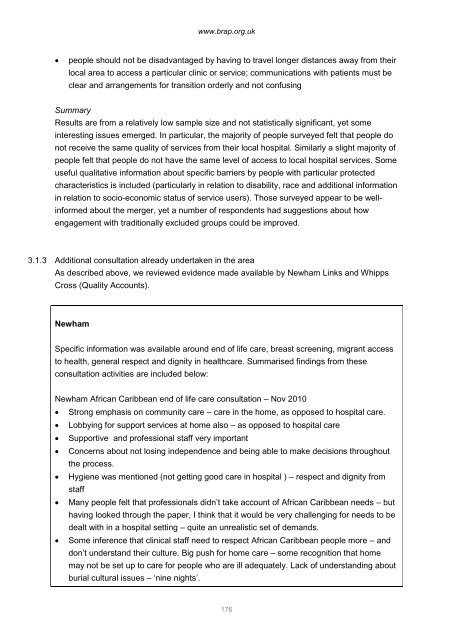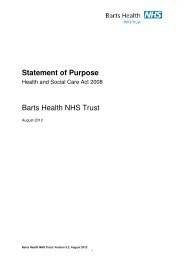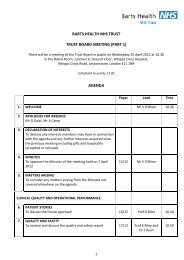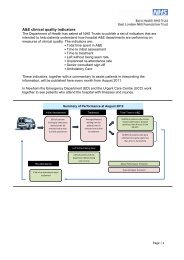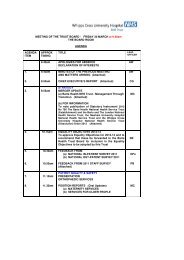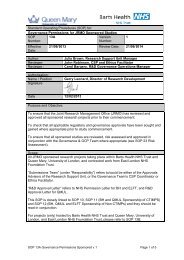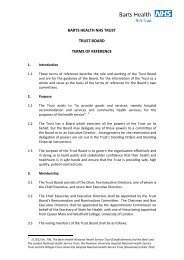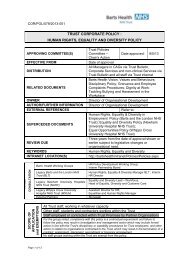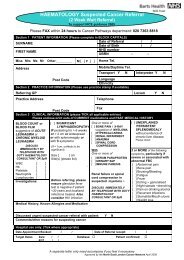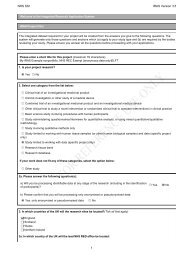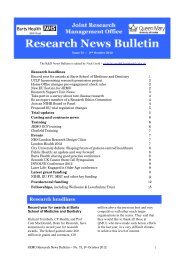Barts Health Equality and Human Rights Impact Assessment Report
Barts Health Equality and Human Rights Impact Assessment Report
Barts Health Equality and Human Rights Impact Assessment Report
- No tags were found...
Create successful ePaper yourself
Turn your PDF publications into a flip-book with our unique Google optimized e-Paper software.
www.brap.org.ukpeople should not be disadvantaged by having to travel longer distances away from theirlocal area to access a particular clinic or service; communications with patients must beclear <strong>and</strong> arrangements for transition orderly <strong>and</strong> not confusingSummaryResults are from a relatively low sample size <strong>and</strong> not statistically significant, yet someinteresting issues emerged. In particular, the majority of people surveyed felt that people donot receive the same quality of services from their local hospital. Similarly a slight majority ofpeople felt that people do not have the same level of access to local hospital services. Someuseful qualitative information about specific barriers by people with particular protectedcharacteristics is included (particularly in relation to disability, race <strong>and</strong> additional informationin relation to socio-economic status of service users). Those surveyed appear to be wellinformedabout the merger, yet a number of respondents had suggestions about howengagement with traditionally excluded groups could be improved.3.1.3 Additional consultation already undertaken in the areaAs described above, we reviewed evidence made available by Newham Links <strong>and</strong> WhippsCross (Quality Accounts).NewhamSpecific information was available around end of life care, breast screening, migrant accessto health, general respect <strong>and</strong> dignity in healthcare. Summarised findings from theseconsultation activities are included below:Newham African Caribbean end of life care consultation – Nov 2010 Strong emphasis on community care – care in the home, as opposed to hospital care. Lobbying for support services at home also – as opposed to hospital care Supportive <strong>and</strong> professional staff very important Concerns about not losing independence <strong>and</strong> being able to make decisions throughoutthe process. Hygiene was mentioned (not getting good care in hospital ) – respect <strong>and</strong> dignity fromstaff Many people felt that professionals didn’t take account of African Caribbean needs – buthaving looked through the paper, I think that it would be very challenging for needs to bedealt with in a hospital setting – quite an unrealistic set of dem<strong>and</strong>s. Some inference that clinical staff need to respect African Caribbean people more – <strong>and</strong>don’t underst<strong>and</strong> their culture. Big push for home care – some recognition that homemay not be set up to care for people who are ill adequately. Lack of underst<strong>and</strong>ing aboutburial cultural issues – ‘nine nights’.176


